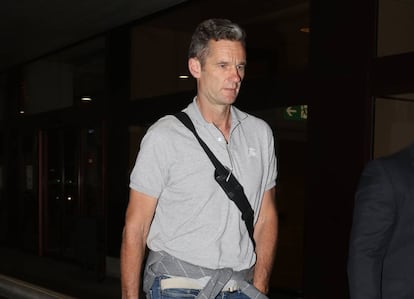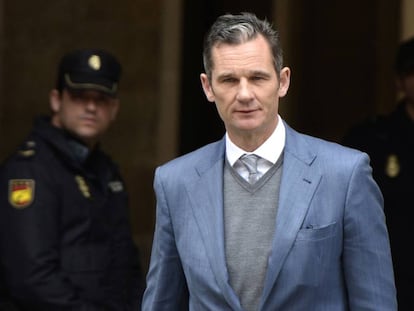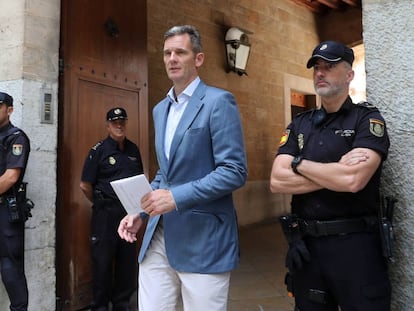Spanish king’s brother-in-law walks into prison to start sentence in Nóos case
Iñaki Urdangarin reported to a penitentiary Monday morning after losing his Supreme Court appeal

Iñaki Urdangarin, brother-in-law to Spain’s King Felipe VI, walked into an Ávila penitentiary early Monday morning to serve a five-year, 10-month sentence in connection with the Nóos graft case.
Legal authorities had given him five days to report to the prison of his choice after the Supreme Court rejected his appeal last Wednesday (although it reduced his original sentence by five months).
Urdangarin, who is married to Princess Cristina de Borbón, the king’s sister, reported to Brieva penitentiary in Álava province at 8.13am, choosing this center over 81 other prison facilities in Spain. He arrived in Madrid on Sunday night on a flight from Geneva, his regular place of residence for the last few years.
Urdangarin and his ex-business associate, Diego Torres, were the leading figures in the Nóos Institute, a non-profit that secured no-bid contracts from the regional governments of Valencia and the Balearic Islands using Urdangarin’s influence.
The center is located near Madrid, making it easier for his wife and four children to fly in from Geneva to visit him
Urdangarin and Torres also used their non-profit to divert around €6.2 million from public contracts secured for organizing sports events into private accounts. Urdangarin’s wife, Cristina de Borbón, sat on the board of a company, Aizoon, that was allegedly used to channel part of these funds. She was made to testify in the case, and was ultimately fined for having benefited from her husband’s scheme, but was acquitted of tax fraud complicity.
Urdangarin, a former Olympic handball champion who married Cristina de Borbón in 1997, was found guilty of charges that included embezzlement, influence peddling and tax crimes.

A regional court in Mallorca tried a total of 19 people for their role in the scheme, including former Balearics premier Jaume Matas, who was also found guilty in the case and who voluntarily reported to prison authorities last Wednesday.
Brieva penitentiary houses around 200 female inmates, and it also has a small unit for male prisoners that is currently empty. This is where a former Civil Guard chief, Luis Roldán, served out his sentence after being convicted of corruption in the 1990s.
The center is located near Madrid, making it easier for his wife and four children to fly in from Geneva to visit him. Urdangarin had been considering Brieva and other penitentiaries near Madrid, such as the ones in Segovia and Zaballa (Álava).
English version by Susana Urra.











































